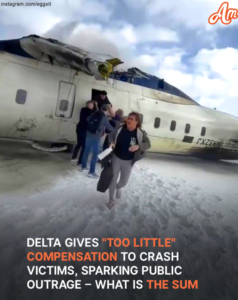On February 17, 2025, Delta Air Lines Flight 4819, operated by Endeavor Air, experienced a harrowing incident upon landing at Toronto Pearson International Airport. The Bombardier CRJ900LR aircraft, arriving from Minneapolis–Saint Paul International Airport, crashed on the runway, overturned, and came to rest upside down. Remarkably, all 80 individuals on board—76 passengers and four crew members—survived the accident, though 21 sustained injuries, including three critical cases.
In response to the incident, Delta Air Lines announced it would provide $30,000 in compensation to each passenger. This payment, described by Delta spokesperson Morgan Durrant as an advance with “no strings attached,” does not preclude passengers from pursuing additional legal action against the airline.
Legal experts have weighed in on Delta’s compensation offer, characterizing it as a goodwill gesture typical in the aftermath of significant aviation accidents. They advise passengers to consult with attorneys before accepting the payment to fully understand their rights and potential claims. The Montreal Convention, an international treaty governing airline liability, allows passengers to seek further compensation upon providing proof of loss or damage.
Public reaction to the $30,000 compensation has been mixed. Some social media users have criticized the amount as insufficient, suggesting it fails to adequately address the trauma and potential long-term effects experienced by the passengers. Comments on platforms like X (formerly Twitter) have described the sum as “crazy” and “missing at least three zeros.” Others have advised passengers to refrain from accepting the initial offer without seeking legal counsel.
Comparisons have been drawn to similar incidents in the aviation industry. For instance, following a severe turbulence event in 2024, Singapore Airlines offered refunds and payments up to $25,000 to injured passengers. In 2009, US Airways provided $5,000 to each passenger after the “Miracle on the Hudson” emergency landing. These precedents highlight the variability in compensation amounts and underscore the importance of context in each incident.
Delta’s CEO, Ed Bastian, expressed his concern over the Toronto incident, emphasizing the airline’s commitment to supporting those affected. He praised the crew’s swift and efficient evacuation efforts, which were instrumental in ensuring the safety of all on board. The Transportation Safety Board of Canada has launched an investigation into the crash, with weather conditions at the time—characterized by blowing snow and gusty winds—being considered as potential contributing factors.
In the interim, Delta has extended additional support to the passengers, including assistance with accommodations, meals, transportation, and the retrieval of personal belongings. The airline’s proactive approach aims to address immediate needs while the investigation continues.
As the situation develops, the offered compensation and the outcomes of the official investigation are likely to influence ongoing discussions about airline liability and passenger rights in the aftermath of such incidents.
